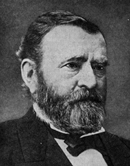Presidential Scandals
Updated February 21, 2017 | Factmonster Staff 

Ulysses S. Grant: Crédit Mobilier & the Whiskey Ring

Although President Grant had some notable successes during his time in office, including the passage of the Fifteenth Amendment and the Ku Klux Klan Act of 1871, most historians agree that his two administrations, lasting from 1869 to 1877, were mainly characterized by indecisive leadership and massive corruption.
The Crédit Mobilier of America was a shell company formed in 1867 by stockholders in the Union Pacific Railroad to build the railroad. Shares in the construction company were then sold or given to influential congressmen, who subsequently profited themselves by approving federal subsidies for the building project and turning a blind eye to expenses, which ensured huge profits for the railroad builders.
The scandal broke in Sept. 1872, as Grant was campaigning for his second term, and a congressional committee was set up to investigate the charges. All of the politicians implicated in the scandal were Republican colleagues of Grant, including outgoing vice president Schuyler Colfax, incoming vice president Henry Wilson, and Speaker of the House James G. Blaine. In the end, only two congressmen were censured by the House, Oakes Ames of Massachusetts and James Brooks of New York; Representative James Garfield (Ohio) steadfastly denied the charges and was later elected president.
The remainder of Grant's second term didn't fare much better.
The Whiskey Ring scandal in 1875 involved high-level government officials who conspired with distillers to defaud the government of tax revenues on the sale of whiskey. U.S. treasury secretary Benjamin Helm Bristow finally uncovered the conspiracy, which reached as far as Grant's private secretary Orville E. Babcock. Babcock was later acquitted through the personal intervention of Grant.
And to cap things off, in 1876 Grant's secretary of war, William Belknap, was impeached for accepting thousands of dollars in bribes in exchange for a lucrative appointment in Indian Territory. Belknap resigned almost immediately, thereby avoiding a conviction by the Senate.
Although Grant himself was never accused of any crime, the succession of scandals during his tenure in office overshadowed to a large extent his popularity as a Civil War hero. Much discouraged, Grant assured Congress and the nation that "Failures have been errors of judgment, not of intent."
The Crédit Mobilier of America was a shell company formed in 1867 by stockholders in the Union Pacific Railroad to build the railroad. Shares in the construction company were then sold or given to influential congressmen, who subsequently profited themselves by approving federal subsidies for the building project and turning a blind eye to expenses, which ensured huge profits for the railroad builders.
The scandal broke in Sept. 1872, as Grant was campaigning for his second term, and a congressional committee was set up to investigate the charges. All of the politicians implicated in the scandal were Republican colleagues of Grant, including outgoing vice president Schuyler Colfax, incoming vice president Henry Wilson, and Speaker of the House James G. Blaine. In the end, only two congressmen were censured by the House, Oakes Ames of Massachusetts and James Brooks of New York; Representative James Garfield (Ohio) steadfastly denied the charges and was later elected president.
The remainder of Grant's second term didn't fare much better.
The Whiskey Ring scandal in 1875 involved high-level government officials who conspired with distillers to defaud the government of tax revenues on the sale of whiskey. U.S. treasury secretary Benjamin Helm Bristow finally uncovered the conspiracy, which reached as far as Grant's private secretary Orville E. Babcock. Babcock was later acquitted through the personal intervention of Grant.
And to cap things off, in 1876 Grant's secretary of war, William Belknap, was impeached for accepting thousands of dollars in bribes in exchange for a lucrative appointment in Indian Territory. Belknap resigned almost immediately, thereby avoiding a conviction by the Senate.
Although Grant himself was never accused of any crime, the succession of scandals during his tenure in office overshadowed to a large extent his popularity as a Civil War hero. Much discouraged, Grant assured Congress and the nation that "Failures have been errors of judgment, not of intent."
See also:
